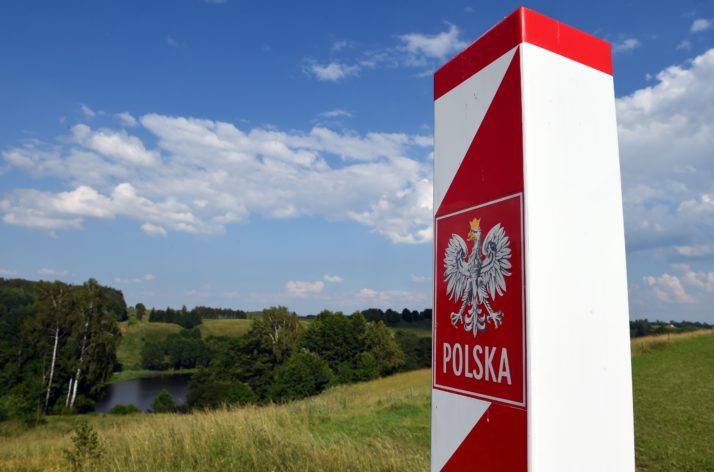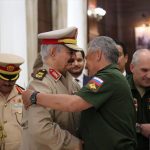Like all the nations of eastern Europe, Poland spent many years under Russian/Soviet rule. Except for brief periods of independence from 1794 -1795, and then again from 1918 – 1939, Poland was subjugated under Russian Imperial rule from 1772 until 1918. After the end of World War Two, Poland came under Soviet rule from 1945 until it declared its independence in 1989 in the wake of the chaotic dissolution of the Soviet Union. By virtue of its unfortunate geographic location bordering Lithuania, Belarus, Ukraine, and the Russian enclave of Kaliningrad, Moscow has always considered Poland to be part of its near abroad and well within its political and military spheres of influence. After the collapse of the Soviet Union in 1991, Russian leaders coined the phrase, near abroad, in reference to eastern European nations that were formerly part of the Soviet Union and often contained a large Russian speaking population. Poland was one such nation, and Moscow has never forgotten its longtime vassal state and onetime ruler. With its long collective memory and recent aggressive behavior, will Moscow attempt to bring Poland back into the Russian Empire of Czar Vladimir I, or will the Kremlin simply be content to continually cause disruption and sow chaos in Warsaw?
Recent military actions in Syria, Libya, Donbas, and Crimea clearly demonstrate Moscow’s propensity for risk taking. According to U.S. Brigadier General Gregory Hadfield, AFRICOM deputy director for intelligence, “Russia is executing the same playbook (in Libya) as successfully employed in Crimea, Ukraine and to a lesser extent in Syria. Russia has proved its willingness to violate sovereign nations, and appears willing to do the same in Africa.” The actions in Libya represent a dangerous expansion of Russian military aggression into the Maghrib (North Africa), a region not previously targeted by Moscow. With this development, Russia has now committed forces, both regular military and civilian mercenaries, to a region stretching from the eastern Mediterranean at Libya to the western Mediterranean at Syria, an area encompassing almost half of the Mediterranean region’s coastline. Is it any wonder NATO is concerned about Russian aggression in its near abroad?
Russian-Polish relations hit a new low when it was discovered that around 22,000 Polish military officers and civilian intellectuals had been slaughtered and then hastily buried in the Katyn Forest near Smolensk in western Russia sometime in 1940, shortly after the Soviet invasion of eastern Poland in 1939 by the Soviet Army. The Soviets had repeatedly denied any involvement in the massacre and blamed the atrocities on the Nazis. An American congressional investigation in 1951 conclusively proved that the Soviet NKVD (precursor to the KGB) was responsible for the mass murders. Although this finding was not made public for many years due to diplomatic and intelligence related reasons, the report was finally released by an executive order from President Obama in 2011. As one can imagine, this revelation did not sit well with Poland, although most Poles had always suspected as much anyway. Years of Soviet oppression from 1945 – 1989 added to the worsening relations. Just when it appeared that relations could not get any worse, in 2010 an airplane carrying Polish President Lech Kaczynski and dozens of top Polish military and civilian leaders crashed near the very site of the Katyn Forest Massacre near Smolensk, Russia 70 years before. All 97 people on-board were killed. The aircraft was a Soviet built Tupolev Tu-154, so accusations of sabotage immediately surfaced. Some Poles even accused the Russian military of shooting down the aircraft.

As if to pour gasoline on the already raging fire of Polish rage over Russian-Polish relations, in December 2019 Vladimir Putin decided to make an outrageous and inflammatory statement that laid the blame for the start of World War Two in Europe squarely at the feet of Poland, the country whose invasion by Nazi Germany in September 1939 launched the official start of the war. Poland then went on to suffer some of the worst Nazi atrocities of the war, including the almost complete genocide of their Jewish population. None of that mattered to the Russian president. According to Putin, “It was them,” he said, “who, while pursuing their mercenary and exorbitantly overgrown ambitions, laid their people, the Polish people, open to attack from Germany’s military machine, and, moreover, generally contributed to the beginning of the Second World War.” Of course, he had plenty of rationalizations for the Molotov-Ribbentrop Pact, the agreement between the Soviet Union and Germany that allowed Stalin to invade and occupy eastern Poland, while Hitler invaded and occupied western Poland. That fact is not included in any Russian textbooks, and to my knowledge, has never been included in any American textbooks. I am quite certain however, that the Polish people do not need any textbook to remind them of that betrayal. They will never forget.
To bring this all back around to the current day, NATO and the rest of the world is still in the midst of dealing with the Covid-19 pandemic and all of the medical and economic fallout associated with this international crisis. The European Union (EU) has sustained a massive economic blow due to the quarantines and shutdowns of their national economies. As an example of how devastating this economic crisis is, France and Germany recently announced an unprecedented proposal to give the EU about 580 billion dollars as a grant to help bail out the most needy members, no payback required. NATO, although slow to initially respond, has now provided many nations with much needed medical supplies, medical and logistical staff, as well as other crucial services. Its support of member nations and even non-member nations is ongoing. However, it is no secret that this unexpected and unprecedented pandemic has stretched NATO resources enormously. That fact has not gone unnoticed by the Kremlin.
Although Russia has also suffered under the Covid-19 pandemic, that has not slowed down Putin’s military and political ambitions. He shows no sign or pulling troops out of Syria, Crimea, or eastern Ukraine, and has just launched a very controversial mission into Libya, including mercenaries and fighter jets. This does not appear to be a man who is dialing back his expansionist moves anytime soon. So what does all of this mean for Poland and NATO?
Poland is a proud member of NATO, hosts several military units of NATO member nations (including the United States), and is currently in negotiations with the Americans to build a major base for the U.S. military in Poland, a controversial move that has angered Moscow. Whether Moscow is offended or not, NATO and the U.S. military is committed to a continuing presence in Poland for the foreseeable future. The Kremlin need only look at its own actions in Crimea, the Donbas, Syria and now, Libya, as well as its cyber-attacks on Estonia and Lithuania to understand this renewed commitment to Poland.
A good example of that renewed NATO presence are the annual war-game exercises such as this year’s Agile Spirit. In an effort to sow confusion and distrust between the Americans and their Polish counterparts, the cyber-warfare unit of the Russian Military Intelligence branch, the GRU, launched a major disinformation campaign during this years’ Agile Spirit exercise. Fake interviews were staged with American commanders and allegedly disparaging comments were made about the Polish people and military. Other fake news items designed to foster chaos during the military exercise were inserted and posted to social media. Polish government spokesman Stanislaw Zaryn said of the GRU cyber-attack in a lengthy statement, “ The disinformation campaign is an attempt to break down alliance cohesion, “destroy the image of the U.S.” and weaken its engagement in Europe, and raise doubts about the reliability of countries on NATO’s eastern flank.” Luckily, this attack was identified early and no serious harm was done. But it won’t be the last time this kind of attack happens to a NATO member. In fact, “Lithuania’s Defense Ministry last month said there had been 807 cases of false or misleading information since February about the virus, much of it focused on Lithuania.”
So on and on it goes. It is very probable Poland will experience many more disinformation campaigns like this one, and most likely, future campaigns will be of a more sophisticated nature. Moscow will, without question, continue to push the envelope and see how much they can get away with. Poland is not safe, not by any means, and they know that. These cyber-attacks are in reality, acts of war launched by Russia in a digital realm against a sovereign nation. In my opinion, they are no different than if several Russian armored divisions backed up by supporting infantry and air cover, stormed across the Polish border and opened fire. These attacks are, in fact, the opening rounds of a war, a cyber-war if you will, but a war, nevertheless. How NATO responds to these attacks on member nations, these acts of war, will determine the future of Poland, the future of the alliance, and the future of western Europe.
I pray they choose the correct response, and soon.
Author
-

Retired U.S. Army Counterintelligence Special Agent. He served in Iraq as a team leader of a tactical Human Intelligence Team (THT). Prior to his deployment to Iraq, David was an instructor at the reserve U.S. Army Counterintelligence Special Agent course. He has published four novels for Grand Central Publishing and is currently finishing a memoir of his experience in Iraq. David has also written articles for Vanity Fair, Salon.com, The American Prospect and The Washington Monthly.
View all posts




